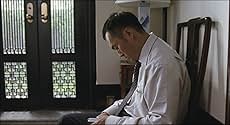Agrega una trama en tu idiomaA successful businessman's family life is shattered by an early onset of Alzheimer's.A successful businessman's family life is shattered by an early onset of Alzheimer's.A successful businessman's family life is shattered by an early onset of Alzheimer's.
- Premios
- 10 premios ganados y 5 nominaciones en total
Fotos
Eri Watanabe
- Kimiko Hamano
- (as Eriko Watanabe)
- Dirección
- Guionistas
- Todo el elenco y el equipo
- Producción, taquilla y más en IMDbPro
Argumento
¿Sabías que…?
Opinión destacada
If "Memories of Tomorrow" seems like "The Notebook," it's because the cinematic adaptation of a novel by Hiroshi Ogiwara deals with the dreaded Alzheimer's disease as it slowly eats away at Masayuki Saeki's (Ken Watanabe) memories and, therefore, life, a process foreshadowed by an image in its opening credits of buildings being constructed played in reverse such that they appear to be deconstructing. Yet the similarity with Nick Cassavetes' sudsy interpretation of Nicholas Sparks' novel end there, as director Yukihiko Tsutsumi, barring a manipulative second act, presents the film's first hour set in corporate Tokyo with such rhythmic precision and expert framing that the urgency of Masayuki's anger and panic over his gradual descent into senility is masterfully portrayed.
A go-getting manager at a top ad agency, Masayuki, just a few months shy of his 50th birthday, has landed a major deal with a client and along with a doting wife Emiko (Kanako Haguchi) and a soon-to-be-married daughter Rie (Kazue Fukiishi), his life isn't just stable; it's an enviable accomplishment. Yet because he keeps on forgetting his clients' names, the highway exit to his daughter's house, and pretty much every trivial details in his life, he sees a doctor as Emiko suggests, where he learns that he suffers the early stages of Alzheimer's Disease.
As typified by one sequence where Masayuki gets lost in Shibuya, Tsutsumi deftly captures his protagonist's mad dash effort to make sense of both his external and internal environment, be it finding his way to the office, or remembering where his marketing team sat during an Italian lunch, or contemplating whether to jump from a ledge upon his disease's confirmation. Tsustumi radically differs in pacing and tone during the latter half as -- after a cheery montage of Masayuki's newfound domestic life following his early retirement -- he deliberates on the emotional and psychological issues of Masayuki, who now removed from the daily stress of urban life, finds it hard to adjust. Insistently stating the fragility of the human mind and human relationships with recurring images of potteries, china wares and cups, Tsutsumi eventually leaves the film to simmer in a treacly syrup which, while admittedly touching, leaves a bitter aftertaste.
A go-getting manager at a top ad agency, Masayuki, just a few months shy of his 50th birthday, has landed a major deal with a client and along with a doting wife Emiko (Kanako Haguchi) and a soon-to-be-married daughter Rie (Kazue Fukiishi), his life isn't just stable; it's an enviable accomplishment. Yet because he keeps on forgetting his clients' names, the highway exit to his daughter's house, and pretty much every trivial details in his life, he sees a doctor as Emiko suggests, where he learns that he suffers the early stages of Alzheimer's Disease.
As typified by one sequence where Masayuki gets lost in Shibuya, Tsutsumi deftly captures his protagonist's mad dash effort to make sense of both his external and internal environment, be it finding his way to the office, or remembering where his marketing team sat during an Italian lunch, or contemplating whether to jump from a ledge upon his disease's confirmation. Tsustumi radically differs in pacing and tone during the latter half as -- after a cheery montage of Masayuki's newfound domestic life following his early retirement -- he deliberates on the emotional and psychological issues of Masayuki, who now removed from the daily stress of urban life, finds it hard to adjust. Insistently stating the fragility of the human mind and human relationships with recurring images of potteries, china wares and cups, Tsutsumi eventually leaves the film to simmer in a treacly syrup which, while admittedly touching, leaves a bitter aftertaste.
- Jay_Exiomo
- 3 jul 2009
- Enlace permanente
Selecciones populares
Inicia sesión para calificar y agrega a la lista de videos para obtener recomendaciones personalizadas
Detalles
- Fecha de lanzamiento
- País de origen
- Sitios oficiales
- Idioma
- También se conoce como
- Memories of Tomorrow
- Productoras
- Ver más créditos de la compañía en IMDbPro
Taquilla
- Total en EE. UU. y Canadá
- USD 140,200
- Fin de semana de estreno en EE. UU. y Canadá
- USD 1,524
- 20 may 2007
- Total a nivel mundial
- USD 17,696,020
- Tiempo de ejecución2 horas 2 minutos
- Color
- Mezcla de sonido
Contribuir a esta página
Sugiere una edición o agrega el contenido que falta

Principales brechas de datos
By what name was Ashita no kioku (2006) officially released in Canada in English?
Responda




















